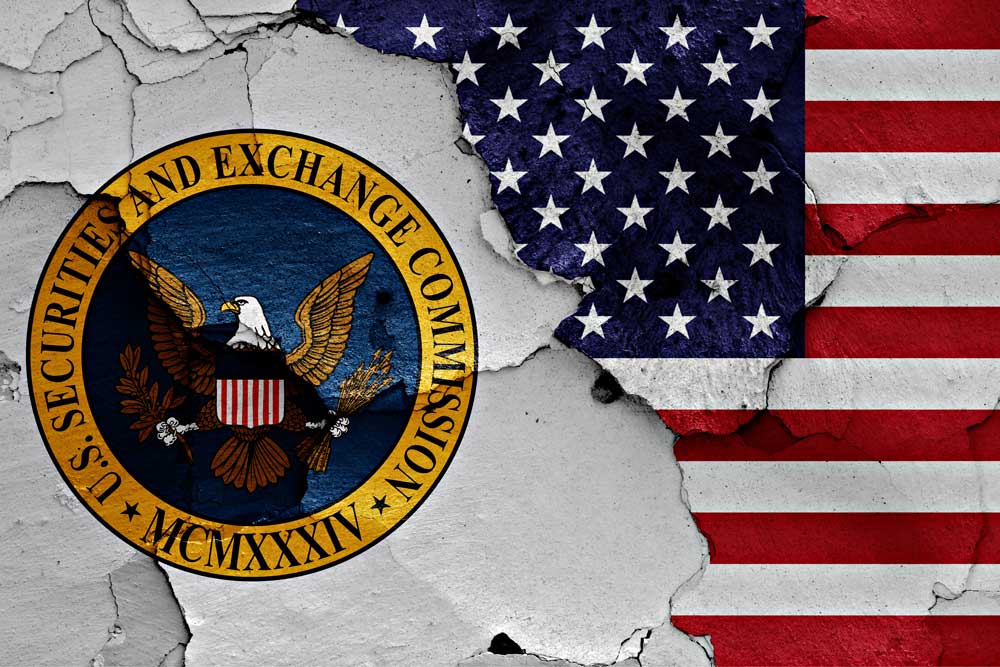SEC Whistleblower Program
Submitting A Tip
Let Miller Law Group Help!
If you have a legal matter you would like to discuss with a Miller Law Group personal injury attorney, please complete and submit the form below. We will get back to you shortly.
Securities & Exchange Commission (SEC)
Financial Fraud
The SEC is the agency charged with enforcing federal securities laws; it has jurisdiction over any fraud or wrongdoing within the reach of those laws. The Commission investigates and sanctions:
The SEC’s Whistleblower Program is one of the most successful federal tip programs. Since its creation in 2010 by section 922 of the Dodd-Frank Act, the program has awarded hundreds of millions of dollars to individual whistleblowers. It incentivizes reporting of securities law violations by providing an award for tips that result in significant enforcement actions (defined as those resulting in at least $1 million in sanctions). Those who provide information are also protected from retaliation by the Sarbanes-Oxley Act.
A set of amendments to the rules, adopted in September 2020, strengthened and clarified the program’s rules and the protections it offers.
How To Qualify For An Award
How Do I Report A Tip To The SEC?
To qualify for an award, you must submit information in one of two ways:
- By submitting the tip through the SEC’s Tips, Complaints and Referrals system at www.sec.gov/tcr. This route, which the agency refers to as the “TCR system,” is the preferred method, and it is the only method that provides written confirmation that the submission has been received. If you wish to be eligible for an award, or for the additional confidentiality protections provided by the whistleblower program, you must respond “yes” to “Are you filing this tip under the SEC’s whistleblower program?” in the About You section of the submission process.
- By mailing or faxing a Form TCR to the SEC at the address below. Form TCR can be downloaded here. The fully completed form should be sent to:
14420 Albermarle Point Place
Suite 102
Chantilly, VA 20151-1750
ATTN: SEC TCR SUBMISSIONS
Fax: (703) 813-9322
You are not required to have an attorney to participate in the SEC’s Whistleblower Program unless you wish to submit your tip anonymously. Anonymous tips are eligible for awards, but only if the anonymous whistleblower is represented by an attorney who provides the required information on the Form TCR or in the online TCR system.

What Determines Whether I Get An Award?
Looking At Eligibility
To get an award, you must be eligible and you must submit a claim for an award. You must be eligible. Eligibility is determined by the nature of the information you provide and by the enforcement actions it produces. You and your information must meet several requirements.
Submit a tip!
Faxes preferred
Once you submit your tip, you must wait for the Commission to investigate and assess sanctions. The SEC posts notices regarding cases that may be eligible for whistleblower awards on its website.
Once a Notice of Covered Action is posted, any applications for award must be made within 90 calendar days. You can sign up to receive alerts when new notices are posted on the Office of the Whistleblower website. If you have been working with SEC staff during the investigation, they may alert you to a notice, but it is your responsibility to monitor this website and submit a timely application once a judgment is entered.
An application must be made using the SEC’s Form WB-APP, available on the website. The Commission prefers that the forms be faxed to (703) 813-9322, but they may also be mailed. Check the website for the mailing address, as it is subject to change.
Note that by posting a notice, the SEC does not promise that anyone is eligible for an award. Once you submit your application, staff will review it and determine whether you are eligible for an award. If sanctions have been assessed but not collected, the Commission may defer your application until sanctions are collected.
How much will my award be?
It depends
Your award will be based on the amount of any sanctions the SEC collects—not sanctions assessed—after it investigates your tip. The SEC pays whistleblowers between 10% and 30% of any sanctions paid by wrongdoers. The ultimate amount is determined by the size of the sanction assessed, the level of assistance provided by the whistleblower, and any “negative factors.”
Negative factors have to do with the whistleblower’s behavior. They include whistleblower participation or culpability in the fraud reported, unreasonable delay in reporting the unlawful activity, or whistleblower interference with internal compliance processes. This last applies when the whistleblower interferes with a company’s attempts to investigate or conceals the violation from internal investigators.
If you are found to be eligible for an award from the SEC and your tip also results in action by other agencies, you may also be eligible for a similar percentage of any sanctions assessed by those other agencies. However, you will only be eligible for a “related action” award if the other agency’s action has a clear, explicit, and direct connection to the conduct sanctioned by the SEC and to your information.
What protection do I have from retaliatory action?
Can My Employer Retaliate?
First, any action to impede or interfere with someone reporting illegal activity to the SEC is itself illegal and can be reported to the SEC’s whistleblower line, regardless of the relationship between the reporter and the target of the party interfering.
If you are reporting information about your employer, you have more extensive protections from retaliation. Under federal law, your employer may not retaliate against you in any way for providing information to the SEC or assisting in an investigation based on your tip. Retaliation may include firing, demoting, or suspending you or harassing or discriminating against you at work.
Retaliatory activity may itself be a violation of securities laws and can be reported to the SEC. Individuals who believe they have been the victim of retaliation have two avenues of direct recourse, one under the Dodd-Frank Act and one under the older Sarbanes-Oxley Act.

Other Whistleblower Practice Areas To Explore
Sarbanes-Oxley Protections
Submitting A Complaint
Under the 2002 Sarbanes-Oxley Act, the Department of Labor’s Occupational Health and Safety Administration (OSHA) is charged with protecting whistleblowers from retaliation. You can find more information about OSHA’s whistleblower protection program at www.whistleblowers.gov.
You must submit your complaint within 180 days of the adverse action. You can submit a complaint regarding illegal retaliation in a number of ways. OSHA accepts reports online, via this form; by fax, mail, or email; or by telephone or in-person at a regional or area OSHA office. You should be prepared to provide any documentation you have as well as copies of recent pay stubs and any other information demonstrating the retaliation.
OSHA will investigate and, if the evidence supports your claim of retaliation, the agency will require the employer to reinstate you, pay back pay and benefits, and any other relief that the agency determines is appropriate.
Find Out How We Can Help You
Schedule a Free Consultation
At Miller Law Group, PLLC, we are guided by the principle of attaining justice for people who have been wronged in their personal or professional lives. To learn more about our services in Raleigh, Cary, Durham and the surrounding area, or to schedule a free initial consultation, contact us today. We look forward to making you a part of our team.

